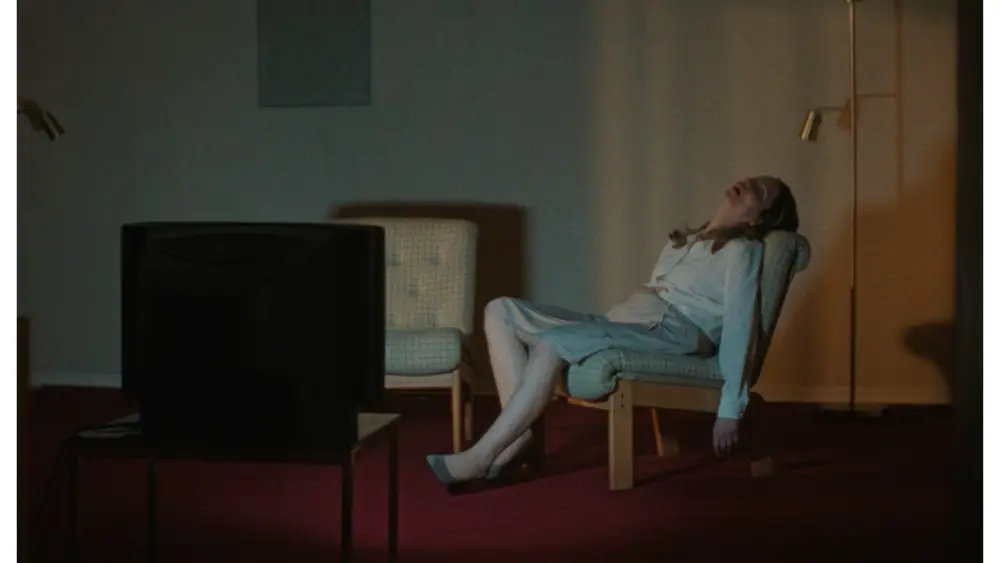Most movies want audiences to suspend their disbelief. I would like to keep “About Heroes” on hand. “Viewers are advised to exercise caution when trusting its visual and aural elements,” says Polish filmmaker Piotr Winiewicz’s irreverent exercise in AI-powered storytelling. An on-screen disclaimer will appear near the beginning. The film is particularly the knowingly controversial opening of this year’s IDFA Documentary Festival. Because a lot of people wouldn’t classify it as a documentary at all. This seemingly hybrid exercise, which wraps an imaginary (and blithely incoherent) murder mystery around a topical discussion of artificial intelligence and its impact on humanity, is a bit more complicated than anything else. It doesn’t offer any assurance to the viewer that it’s more “authentic” than the real thing. It has some wit for a feature-length stunt, but it lacks ideas and arguments.
Still, About a Hero’s flashy conceptual gimmicks and big-name actor involvement should be enough to grab the attention of distributors as the film makes its way through the docfest circuit — even if they Even if none of the big names were actually in attendance. Not directly, anyway. Inspired by director Werner Herzog’s words, “In 4,500 years, no computer will be able to make a movie as good as mine,” and Winniewicz built an AI model based on the venerable director’s body of work. training and used both to script an unexplained fictional story. To create a replica of Herzog telling the story of death in a German factory town. The model, named Kasper (last name Hauser), is like many AI creations, close to the real thing but eerily distorted in every way. It starts with a deepfake imitation of that characteristically husky Herzog voice, which is almost off-level. A party trick impression.
That’s kind of the gist. “About Heroes,” which hardly feels like an exercise in AI advocacy, seems to revel in its legitimacy. While contesting Herzog’s dismissal, the story proves Herzog right. It’s not entirely Kaspar’s creation, but it’s an adaptation. By Winiewicz from the model output — it gets progressively more confusing. As such, the film may not work as effectively on its own as it does in a festival setting or as a literal conversation starter to accompany a post-screening Q&A.
Divided into several chapters without following a logical numerical order, the story focuses on an invisible figure. Dorem Clery is an unremarkable employee of a kitchenware factory in the fictional German town of Getunkirchenberg who is found dead under various circumstances, possibly due to criminal activity. I don’t fully understand the AI storytelling mistakes. It is revealed that he was working on a mysterious project simply named “The Machine”, itself a symbol of AI development, and perhaps in some way responsible for his death. However, the film’s exploration of this aspect is repeatedly sidetracked by its focus on Clery’s widow Eleonore (Ime Bekkar). Eleanor channelizes her grief into interactions with household appliances, which ultimately transform into the most literal desire for technology.
“If you think in your head that this is obvious, definitive, and watchable, then you’ve lost your mind,” Fake Herzog gasps as Eleonore frolics in the toaster. leak. This is not the first time that “On Heroes” has deliberately asserted its content. It’s in the jokes that are flawed in structure and wear a little thin by the end of the film. (Winniewich would have been better off letting viewers point out the glitches themselves, such as the repeated misspelling of the word “police” in the film’s procedural sections.) Mudede (including cultural critic Charles) mostly offers thoughtful but non-committal reflections on AI, doing little to shake or shape the film’s flimsy thesis. Eight years ago, Herzog’s documentary Behold the Illusion of a Connected World featured far fewer metatextual tricks, but more substantively reflected humanity’s own impending battle with digital innovation. I did.
“I don’t mind rejecting the idea that humans are the greatest and ultimate intelligence,” Mudede says. But About a Hero doesn’t really touch on the potential of AI as a posthuman construct. Especially since AI’s own efforts at technology are being scrutinized and tweaked by filmmakers, whether for reason, irony, or entertainment. . The film would almost certainly be more watchable with that level of human involvement. It’s beautifully shot and designed, with a really funny supporting performance from Vicki Krieps, who plays a jaded reporter investigating the Clery case. But if it’s a provocation, it’s a winking and cautious one, suggesting that life and art as we know it will continue to exist for some time yet, if not necessarily until 4,500 years. There is no doubt that it stands in its own way to make people feel at ease.
